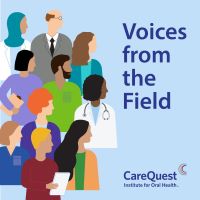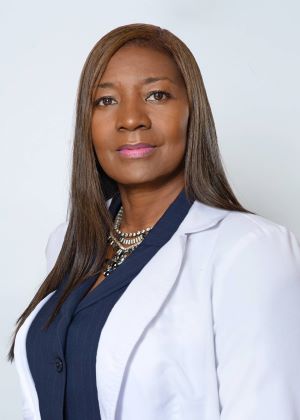Enter your email to receive the CareQuest newsletter:
March 24, 2022
Dr. Deborah George has worked at the Jessie Trice Community Health System, a Federally Qualified Health Center in Florida, for more than 25 years. In her roles as the executive president of community affairs and chief dental officer, she oversees the system’s oral health program while cultivating collaborative relationships with community stakeholders. Dr. George’s career has focused on public health and university-based clinical and dental health care, rooted in her commitment to helping ensure that individuals have access to high quality health care and education.
 Dr. George took some time out of her busy schedule to share her perspective on the many changes the COVID-19 pandemic brought to the oral health industry. She’ll be part of a panel of experts who will explore the topic during the April 7 CareQuest Institute webinar.
Dr. George took some time out of her busy schedule to share her perspective on the many changes the COVID-19 pandemic brought to the oral health industry. She’ll be part of a panel of experts who will explore the topic during the April 7 CareQuest Institute webinar.
How did you first get into dentistry? Was there a moment in your life that pulled you toward that career path?
There is no greater honor than human service. My brief career working as a nurse in public and university-based hospitals reinforced my desire to serve and help people live healthier lives. I wanted to play a greater role in health care delivery. My firsthand awareness of the oral health disparities and inequities existing among low-income racial and ethnic minority groups and the underrepresentation of Black women in the dental profession influenced my decision to become a dentist.

Is there a woman in your life who influenced you on your path to becoming a leader?
First and foremost, I owe this honor to my grandmother and mother. And I have been surrounded by inspirational mentors, courageous leaders, nationally recognized CEOs, and grateful patients throughout my dental career. It is my personal connection to purpose and my duty to represent and be a vessel for those who sacrificed their lives to pave the way, not only for me, but for many women and colleagues to provide quality health care to those who need it most.
Why is it so important that we focus more attention on providing preventive care, especially to underserved populations?
Preventive care saves and improves lives. It has been reported that the four essential risk factors for severe COVID-19 include diabetes, high blood pressure, heart disease, and obesity. These factors place people at-risk for severe complications from COVID-19 and have known associations with poor hygiene.
Can you describe what delivering care throughout the COVID-19 pandemic has been like?
It became very personal to me. I lost a young, bright, and promising family member. At the same time, I felt fortunate to be a health care provider at Jessie Trice Community Health System. We provided teledentistry, emergency care, access to food, masks, COVID-19 tests, and vaccines to thousands of individuals. The benefits of offering COVID-19 testing in practices, which was quick and easy for patients, provided staff members with some reassurance about the health status of the patients who needed to be treated. We also had dedicated outreach oral health staff charged with providing cultural messaging and education on prevention and COVID-19, information on how to access COVID-19 testing and vaccines, and information on how to set up teledentistry visits.
Do you think the pandemic revealed any unique opportunities?
Dentists’ ability to administer vaccines and point-of-care health screenings. Oral health professionals play a role in helping patients achieve better overall health and may prevent the onset of chronic disease. There’s a need to strengthen medical-dental integrative care.
What pandemic-related changes to dentistry have you seen?
I’d highlight four:
- I’ve seen increased access to point-of-care screenings in the dental setting, including COVID-19, HbA1c, and pulse oximetry tests.
- We have dental equipment designed to decrease the generation of aerosol during dental procedures.
- More dentists are receptive to the latest dental technology that will increase access to care and reduce the time patients spend in the dental chair—things like 3D imaging and 3D dental impression scanners.
- We’ve seen an increase in the application of silver diamine fluoride.
Which of those changes do you think are likely to stick?
First, I see telehealth as an opportunity to provide team-based care during a single visit (medical, dental, and behavioral health) as promising and long-lasting. I’d add the standardization of dental visits to include blood pressure checks, BMI, and glucose reading when required. Lastly, a positive change for patients: There’s been an increase in community literacy on oral manifestation of systemic diseases.
If you had a magic wand, how would you make dental care more accessible and equitable?
I would retire the professional title, “Dentist” and replace it with, “Oral health physician.” In addition to that, I’d promote dentistry as a specialty of medicine. This may influence the public perception and mindset on the value of a holistic approach to health care and how oral health is integral to overall health. Dental care can also become more accessible through health policy changes, including required well-child visits. School health physicals should not be deemed complete unless the individuals receive age-appropriate dental visits.
Editor’s note: Voices from the Field is a series of blog posts that highlight individuals who are working to improve the oral health system. From providers and policymakers to advocates and patients, we provide a snapshot of the backgrounds, ideas, successes, challenges, and daily lives of people who are making oral health care more accessible, equitable, and integrated. If you know someone we should feature, please write to us at marketing@carequest.org.